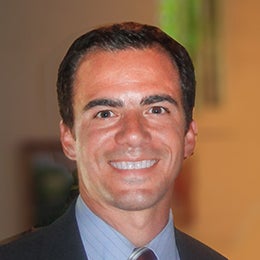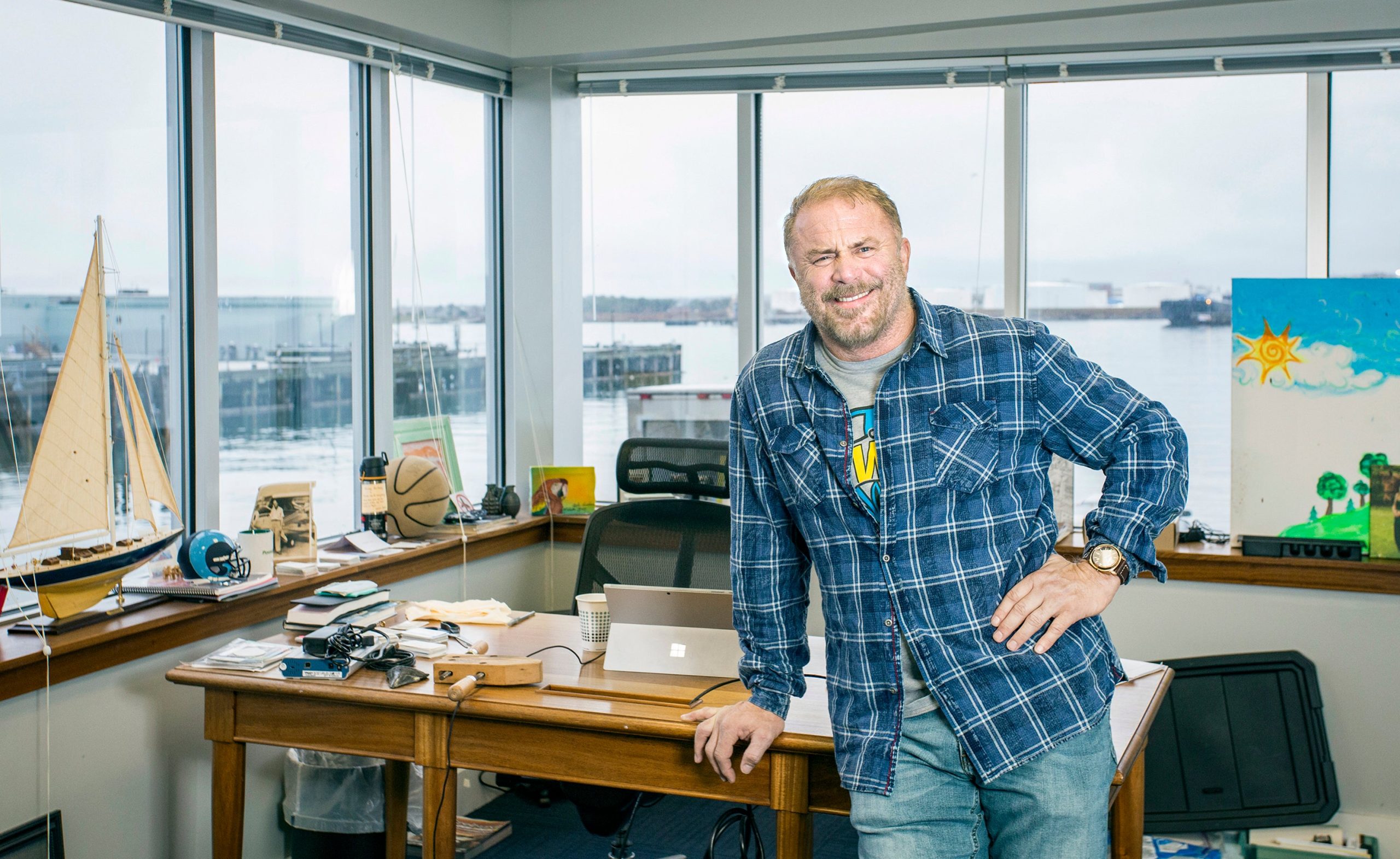Financial technology, or fintech, startups are turning Maine’s largest city into a fintech hotspot — enough to grab attention from investors, job seekers and big players looking for acquisitions.
Get Instant Access to This Article
Subscribe to Mainebiz and get immediate access to all of our subscriber-only content and much more.
- Critical Maine business news updated daily.
- Immediate access to all subscriber-only content on our website.
- Bi-weekly print or digital editions of our award-winning publication.
- Special bonus issues like the Mainebiz Book of Lists.
- Exclusive ticket prize draws for our in-person events.
[bypass-paywall-buynow-link link_text="Click here to purchase a paywall bypass link for this article"].
Financial technology entrepreneur David Joseph is a Yale- and Juilliard School-educated former restaurateur and wine wholesaler who now calls himself a “simplified sales tax evangelist.”
He’s the co-founder of DAVO Technologies, a Westbrook-based provider of automated sales tax management for small businesses across the country. The 16-employee startup was born out of Joseph’s tax frustrations as a New Jersey restaurant owner.
“Sales tax was a constant, the bane of my existence,” he says, recalling the day a state tax collector came by and demanded $15,000 in two weeks or else.
“I walked out of the kitchen saying, ‘Why can’t someone do our sales tax the way ADP does payroll?’ That was the germ of DAVO.”
Joseph teamed up with a customer to apply for a patent that took a decade to come through. When it did, they started their business in 2014. Today on his own, Joseph is seeing 120% annual growth amid plans to scale up with $2 million recently raised from angel investors. DAVO shares an office at the Dana Warp Mill with Wallit, a savings app provider launched by Mike Vien in April and already up to 30,000 users. Its 12-strong workforce consists of six-full timers and six independent contractors, in engineering and sales and marketing.

DAVO and Wallit are among a burgeoning crop of financial technology, or fintech, startups operating out of the Portland area. Together, they’re turning Maine’s largest city into a fintech hotspot — still a ways from rivaling Boston’s Route 128 as another eastern Silicon Valley, but impressive enough to grab attention from investors, job seekers and big players looking for acquisitions.
Acquirers include EVO Payments (Nasdaq: EVOP), an Atlanta, Ga..-based payments processing firm that acquired three Portland firms, and privately held BlackHawk Network, of Pleasanton, Calif., which bought CashStar in 2017 and employs more than 100 people in Portland today.
Why so much activity here? “Portland has created an amazing niche of fintech companies, due to the intersection of talent and technology,” says Nancy Strojny, who leads the Portland chapter of SCORE, which provided free mentoring to DAVO and named it last year’s top successful innovative business in Maine.
The Maine Technology Institute is equally bullish on the niche field, investing in three startups including DAVO and Wallit because “it is a sector that we are actively supporting,” says MTI President Brian Whitney.
Vien, in fact, lives in Boston but says he chose to base his company in Maine because of “progressive” support organizations like MTI and the Finance Authority of Maine, and because it has more banks and credit unions than any other state. “There are also a lot of payments companies,” he says,” so it made sense culturally to be in Maine, and Portland, especially.”
The big kid on that block is WEX Inc. (NYSE: WEX), a global corporate payments provider with $1.5 billion in 2018 revenue. It’s so bullish on Portland it invested $10 million in a new $40 million East End waterfront headquarters.
The fintech boom in its own backyard has WEX executives excited.
“Fintechs are popping up all over the place because there’s opportunity all over the place,” says Jay Dearborn, president, corporate payments. “He notes that WEX, which owns a bank in Utah, positions itself as both a fintech and a bank.
Because fintechs are clients as well as rivals, Dearborn is not concerned about more competitors entering the fray, saying, “It’s making banks better, it’s making WEX better, and giving WEX a new market opportunity. Part of what we do is arm them with our best-in-class payment technology.”
Fintech’s growing appeal
Investopedia describes fintech as new technology that seeks to improve and automate the delivery and use of financial services. Startup businesses in the space are also commonly referred to as fintechs.
Mainstream consumer examples include ride-sharing services like Uber and Lyft, Apple Pay and mobile banking. An Ernst & Young report in June found that close to two-thirds of digitally active consumers worldwide use fintech, and more than a quarter of 1,000-plus organizations surveyed used fintech for banking and payments, financial management, financing and insurance in the last six months.
E&Y Americas Fintech Leader Matt Hatch said at the time he expects the trend to accelerate, as nonfinancial players enter the space and use technology and innovation “to provide frictionless, transparent and highly personalized service.”
Zero fees and transparent pricing are often another advantage over banks and other traditional financial services providers.
Zipping along
Portland’s fintech scene has roots going back to the 1980s, with WEX predecessor Wright Express and First Merchants Bancard Services, founded by brothers Steve and Jim Goodrich in the Time & Temperature Building, where they shared a phone line with an elderly watch repairman. A decade later they sold First Merchants to a Tennessee firm and started payment processing provider Power Pay, later sold to EVO.
In 2014 Steve Goodrich bought Florida-based National Payment Card Association, which he moved to Portland and rebranded as ZipLine. Today, ZipLine is a private label debit card and rewards provider that processes six million transactions a month for clients including convenience-store chains Irving, 7-Eleven and Circle K, saving merchants around $50 million a year in fees to credit card companies such as Visa and MasterCard. Supermarkets Giant Eagle and Big Y are also clients.

ZipLine, which also offers mobile payment solutions to retailers, employs 50 people in Deerfield Beach, Fla., and 25 in Portland including a CIO and CEO who had worked at Power Pay. ZipLine says finding staff hasn’t been a problem. To win business, ZipLine’s in-house business intelligence team led by Chief Marketing Officer Kristen Bailey makes return-on-investment calculations for each potential client, based on data analyses from colleagues focused on consumer engagement. ZipLine can then present its case for helping clients boost loyalty-program member enrollment and transaction volumes.
“We get our arms around the entire guest experience on behalf of our merchants,” Bailey explains, “so instead of just tossing the technology over the fence, we now do the exact opposite. We hug the merchant to help them build their relationship with their customers.”
Goodrich, who says he’s learned more from running ZipLine than all his other businesses, puts it this way: “It’s kind of gone from a science project experiment to an accepted form of payment in this space.” Looking to extend its loyalty program services to other sectors, ZipLine is starting to talk to restaurants as well.
Revved up for 2020
Like ZipLine, MuniciPAY — which was carved out of Nationwide Payments when it was sold to EVO last year — is expanding beyond its core business. Currently a cloud-based payment system for 1,500 municipalities in every state except Hawaii, it has turned its attention to hospitals and other medical facilities that use a multitude of payment systems. By the first quarter of 2020, the eight-employee firm plans a new software release to existing customers as it revs up for faster growth.

“We think 2020 is going to be a pretty significant year,” says co-founder and CEO Jamie Nonni. “30% to 40% is being hopeful, but I really think it’s going to be significant in terms of revenue and transactional business.”
Kevin Busque, founder and CEO of a company called Guideline that automates retirement plans for small businesses, has big plans of his own for 2020.
The San Mateo, Calif.-based startup employs 50 people at a Portland office it opened this summer, and expects to hire 30 more in 2020. A new direct-to-consumer product was set to launch as Mainebiz went to press.

“Recruiting for Portland has been quite easy for us,” says Busque, who’s lived all over the world including Maine’s northern Moosehead Lake region. “We are getting some engineering talent out of Boston attracted by the whole live-and-work-in-Maine movement, and we get people already living in Portland.”
Meanwhile in Westbrook, Joseph says DAVO has not gotten any takeover yet, but he knows there will be an exit somebody. “The reason we’re successful right now is nobody’s figured out how to do what we do,” he says. “As we grow, we certainly know people are watching.”
Editor's Note: This article was corrected to indicate that BlackHawk Network purchased CashStar in 2017.
